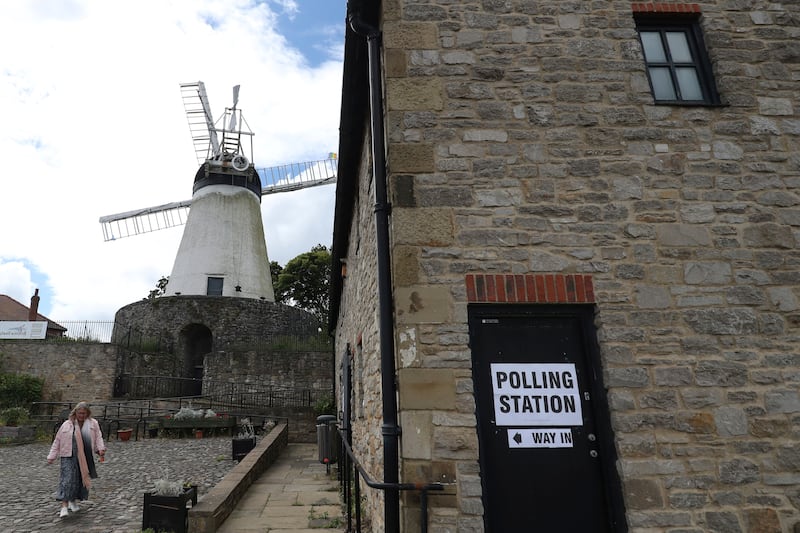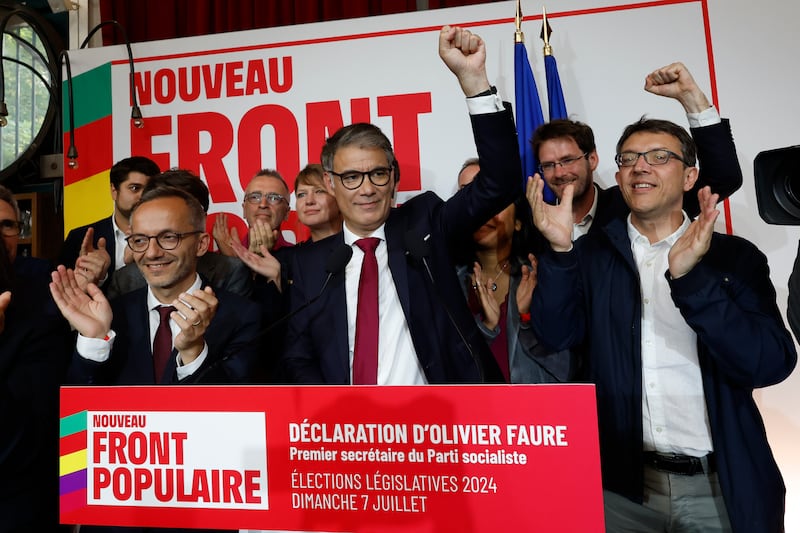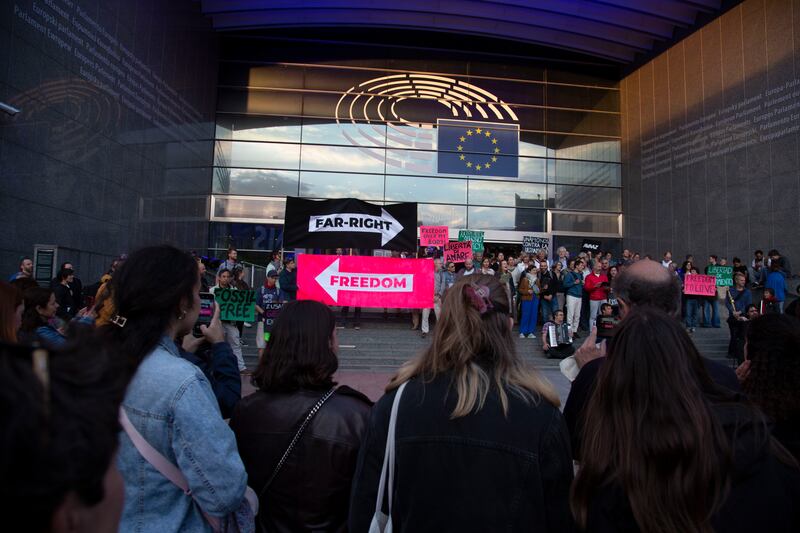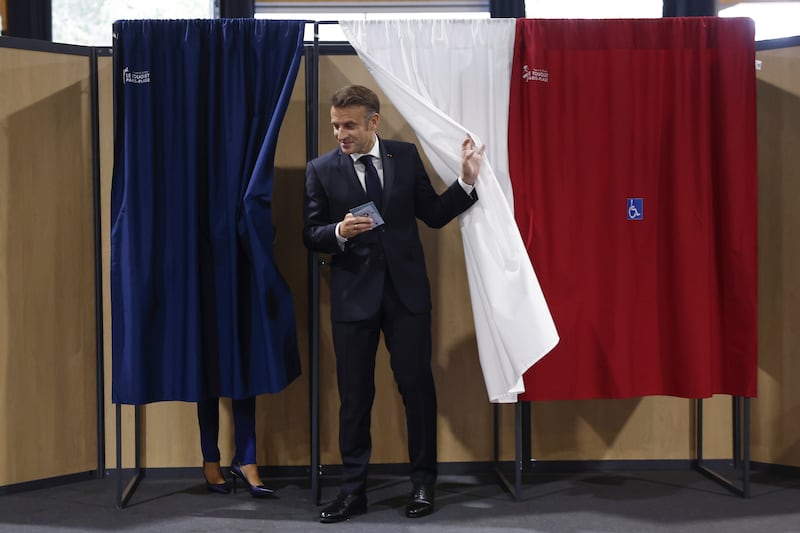Midway through the world’s biggest election year in history, America’s allies across the pond in the United Kingdom, France and the European Union have now completed their voting. Results of these elections are now settled and clear, but what to make of them is not.
The conservative Tories were kicked out of the UK’s highest leadership as expected, while the far right National Rally, which advocates against immigration out of concern for diluting French identity, was unexpectedly prevented from gaining this same power in France, thanks to a centrist and left-wing coalition. In earlier European Union elections, the balance of power shifted slightly with right-leaning populist parties making some gains, while pro-EU centrist, liberal and environmentalist parties lost seats.
Alongside the continued contest between left- and right-leaning politics overseas, an internal battle over the future of liberal and conservative movements is underway across the Atlantic, much like it is here in the U.S.
The Deseret News spoke to several experts in European politics and history at Utah’s universities to hear what stood out to them across elections, in order to make sense of what these results mean.

Overwrought fears of a populist takeover?
The election in France “showed that right-wing populism has some limits to its popularity,” Colin Flint, a political scientist at Utah State University from Great Britain, told the Deseret News. “And if there’s a concerted effort … the populist right can be held at bay.”
Populism also exists on the left, although the right-leaning variety is “much more pervasive,” according to the Institut Montaigne, a think tank in Paris. In each case, populism proclaims “a major rift between a supposedly united, good and virtuous people, and a homogeneous, perverse elite permanently plotting against the former.”
For populists, the Institute continues, “no issue is complicated, there are only simple and immediate solutions” — with society’s main problems arising from groups compromising the country’s noble heritage (from immigrants, foreigners, Muslims or Jews, to woke activists and atheists). Their most reliable answers for these problems, from this vantage point, center in granting new power to a leader who “supposedly embodies the people,” reflecting confidence in the “boundless sovereignty of the people” and an elevation of “direct democracy over what they consider to be outdated forms of liberal and representative democracy.”
The drumbeat of concern about potential right-leaning populist gains was tangible preceding both French and EU elections — e.g., “This time, the far-right threat is real” (Politico in February), “A far-right takeover of Europe Is underway” (Foreign Policy in March), “Rise of the far right keeps EU lawmakers up at night” (Politico in April).
These kinds of repeated preelection stories make these eventual results even more surprising, reflected in headlines like this from CNN last week: “As Europe turns right, why has a center-left party won by a landslide in the UK?” Earlier media cautions are now being portrayed by some as either effective tools to influence voters, or excessive hand-wringing that didn’t turn out to be justified.
BYU political scientist Darin Self suggested before the elections that such “wave of populism” fears could be overstated — a judgment perhaps vindicated in these results, where France and the UK have installed more strongly left-leaning leadership than in recent memory. And despite some increase in populist influence at the EU, the center-right (more moderate) European People’s Party remains by far the biggest bloc in the 27-nation assembly.
“We worry a lot about right-wing populists winning power,” said Kirk Hawkins, a Brigham Young University professor who leads one of the most comprehensive populism research initiatives in the world. Yet he noted that such worry doesn’t typically become reality due to the general lack of majority support in wealthy democracies for most populist politicians on either the left or the right.
“Before each round of elections, we talk about the sky falling,” he said, before witnessing eventual results like just happened in Europe, with far more limited populist gains. “It would help politicians and commentators more if they took this as the most likely scenario,” Hawkins suggested.
“Evidence of rising right-wing forces in Europe is much more limited than the alarmist rhetoric would suggest,” agreed political scientist Scott Cooper, author of “Who Commits the Most to NATO? It Depends on How We Measure Commitment.” He argues that “despite all the hand-wringing about the rise of right-wing forces in Europe,” there is plenty of evidence that the far right “still faces some severe hurdles.”
For instance, the Tories’ “worst electoral result in their two-centuries of history,” this BYU scholar said, demonstrates that the “British electorate rejected their move to the right, as well as their recent incompetence in governing.”
Even so, Flint argued that “any sense that the populist right has been defeated or is in retreat should be stated with caution,” agreeing with many other observers who believe “the populist right will still be extremely influential in politics.”
“They can either disrupt politics, so nothing really gets done, or they can drive and influence policy — because everyone’s looking over their shoulder at the populist right.”
Furthermore, the “issues that the populist right can latch onto aren’t going away,” this Utah-based British political scientist said, pointing to immigration and taxation, in particular, as “underlying drivers” of popular discontent that remain very much on people’s minds in Europe.

A left-wing ascendency?
Writing for The Federalist, Hayden Daniel called French President Emmanuel Macron’s recent partnership with the far left in order to beat the far right an “unholy alliance,” which will most likely result in “even outright communist parties becoming part of the new government.”
”Elite technocrats will gladly form a cynical but highly effective alliance with radical left-wing ideologues rather than let the right have a victory,” he wrote.
(Right and left-leaning terminology in Europe generally maps onto American usage of the terms, with language like far left and left-wing, and far right and right-wing, used in both Europe and the U.S. to differentiate between more moderate and centrist strains of liberals and conservatives. There are, of course, regional differences in the primary concerns taken up — with European partisans, for instance, especially focused on the value or harm of the centralized European Union.)
Henry Olsen argued in The Telegraph in November that “leftist populism is the real threat to democracy” in Europe — going on to highlight what he viewed as a “clear double standard” in how media treat the two. As he stated, “the outsized fear towards one set of populism while neglecting the views of another is deeply problematic.”
Flint agrees that people are more concerned about right-leaning populism than left-leaning populism, and acknowledged the recent French outcome was partly achieved by a strategic coalition between centrist leaders and left-wing populism.
But the USU scholar pushed back on the idea that some sort of left-wing ascendency is currently taking place in Europe, pointing to the fact that part of new British Prime Minister Keir Starmer’s success was to “squash” the left-wing arm of the Labor party, with Jeremy Corbyn (the UK’s Bernie Sanders) getting kicked out of his party. Starmer also confirmed in his victory speech a fundamental shift in the party toward more of what Flint calls a “center-left social democratic party.”
Hyperpolarization on both sides of the Atlantic
Alongside this back-and-forth shifting in power, there continues to be evidence of hyperpolarization in Europe similar to what we see in the United States, said Stewart Anderson, a historian at BYU with expertise in the post-war period in Germany.
Throughout the decades after World War II, he remarked on how many European countries adopted a parliamentary process requiring consensus between any number of (multiple) parties having to work together as a ruling coalition.
“This is starting to fray,” Anderson said, suggesting that “Europeans are more polarized than any time since 1945.”

After noting a heightened level of polarization and dissatisfaction evident in both the U.K. and France, reflected in “widely divergent views on that the best way forward,” BYU political science professor Celeste Beesley anticipated that the resulting power struggle in France means “we shouldn’t expect to see a very activist government or a lot of international leadership from France in the current circumstances.”
Noting similar tension between right- and left-wing EU politicians, she likewise predicted that we should “expect to see more reserved/less bold or dynamic action from the EU in terms of EU-wide policy or foreign affairs.”
Voting against, rather than standing for something
“There’s a reason populism on the right is so popular,” Anderson added, while citing figures that suggest a 20-30% ceiling of support for populist parties on the continent. These populist parties, he suggested, are realizing they need to do more than just voice opposition to issues such as the EU or immigration, and instead articulate what they stand for.
In that sense of positive vision, he suggested, there’s “not much there.”
Flint, who co-edits the international journal Geopolitics and co-authored the renowned textbook “Political Geography,” pointed to similar oppositional dynamics in the English election, fueled by an underlying “dislike” of the status quo conservative rule. People were lukewarm toward the alternative party, he argued, but were motivated to “get out the Tories.”
Rather than the political center being all that appealing and people liking what it had to offer, he suggested that voters embraced it “because of what it’s able to prevent” — seeing it as “a barrier to the rising of the populist right.”
Battling for the conservative soul
Flint highlighted the intense debate happening between an estimated 50% of Tory members who support a merger with Nigel Farage’s far-right Reform party, compared with an estimated 50% of members of Parliament (MPs) that the Guardian classifies as centrist.
This battle within the conservative movement is not unique to the U.S. “Radical right parties are increasingly taking over the space occupied by traditional conservative parties,” said Kirk Hawkins — citing the U.S., France and the U.K. as the latest examples.
“In some ways that reflects democracy at work,” he said. “Voters aren’t satisfied with the stance of traditional conservative parties on some key issues. But the tenor of these parties (like those of the radical left) is also more confrontational.”
A similar battle is taking place among parties on the left, experts acknowledge. “This makes us more polarized and less able to get legislation done and solve our policy problems,” Hawkins cautioned.
Democracy in action
Despite the obvious tumult in international politics, University of Utah professor John Francis, an expert in European politics, pointed earlier this year toward evidence of “democratic competition” across the globe that is “lively and making a difference” in various countries.
Recent European results likewise show that things are “very fluid,” with the main pattern across elections arguably being “flux,” Flint said. “I don’t think there’s anything linear in that process” and “nothing definitive,” he added, admitting that we “still don’t quite know what’s going on.”
“What happens in the next round of elections could be really different.”
“This is an unstable moment, at home in the U.S. and abroad,” French scholar Daryl Lee told me, after returning from a month in France. “And in many nations the swings feel dramatic and quicker than in the past, like a ship pitching left and right, bereft of a sense for when things will settle.”
More than anything specific to populism or a single political ideology, Cooper argued that the most important story in these elections is that people in Europe (like in the U.S.) are “unhappy with the status quo.”
In both countries, he said there is “rising popular dissatisfaction with government” as citizens are “frustrated with lack of progress in their living standards” along with government failures to effectively resolve social issues like immigration.
“So the biggest single trend I see is people voting out incumbents, which is great for the opposition parties temporarily.” But in a few years, these same victorious parties today “will be the incumbents and unless there is significant economic progress they will be the ones being voted out.”
Rather than voters going right or left for ideological reasons alone, Cooper suggested the “biggest story” is that “voters are angry and want change — and will vote for whoever seems to be most likely to provide it.”



